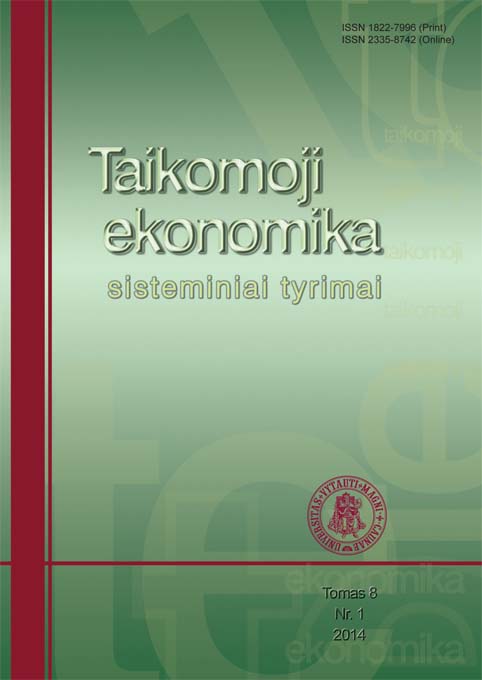Monopolinės kainos reguliavimas tarptautinio kainos pozicionavimo metodu: Lietuvos atvejis
The pricing in monopolistic sector using international price benchmarking method
Author(s): Inga Maksvytienė, Mindaugas DapkusSubject(s): Economy
Published by: Vytauto Didžiojo Universitetas
Keywords: Monopolijos; Reguliavimo metodai; Kainodara, Kainos pozicionavimas; Vandens tiekimo sektorius; Monopolies; Regulation methods; Pricing; Price benchmarking; Water supply sector
Summary/Abstract: Straipsnyje analizuojamas monopolijų reguliavimas remiantis kainų nustatymo metodais. Čia teigiama, kad kaštų pagrindu paremti monopolinių produktų kainų nustatymo metodai yra neefektyvūs, nes kontroliuojančioms institucijoms sudėtinga tiksliai įvertinti technologinius procesus ir su jais susijusius kaštus. Straipsnyje siūloma besivystančioms šalims naudoti tarptautinio kainos pozicionavimo metodą (angl. international price benchmarking). Autoriai pateikia patį metodą ir pritaiko vertinant Lietuvos monopolinio geriamo vandens sektoriaus kainų lygio vertinimui, bei ateities dinaminiam kainų nustatymui. One of the methods of monopolies’ regulation is the price regulation. It comprises the price cap, the profit rate determination, control of production cost. The biggest problem of all regulators is the lack of information, which creates an agency dilemma. Monopolies’ operators keep the power over technologies’ knowledge and so over the technological cost. That’s why last mentioned price regulation methods, based on operators costs, integrate inefficiency’s root. This deficiency could be diminished by Price Benchmarking Method, which states about need of the orientation on the best practices effectuating monopolistic activity; so the pressure on monopolistic operator could be exercised through the price setting on the level of leading companies’ price (and especially on leading international companies’ price). In such way established prices for particular operator are economically based and so can be used to stimulate monopolists to improve their activity ignoring operators’ internal cost development (so bypassing the agency problem). Especially this method is useful for less developed countries, where the practice of price setting on the base of cost is habitual, and where the monopolistic pressure on society is big. In proposed research is treated the problem of efficient price setting using international price benchmarking method. The purpose of the study was to propose the method for benchmarking based price setting in Lithuanian monopolistic water supply sector and demonstrate its applicability. The proposed price benchmark method is based on the households’ water expenses evaluation according purchasing power parity in some comparable countries. This evaluation, however, was corrected according specific situation of countries, which could influence on the costs of production: the factors involved in model are infrastructure’s construction cost differences, market density, taxes’ gap. As benchmarking countries were selected Netherlands, Denmark and Germany.
Journal: Taikomoji ekonomika: sisteminiai tyrimai
- Issue Year: 8/2014
- Issue No: 1
- Page Range: 51-65
- Page Count: 15
- Language: Lithuanian

